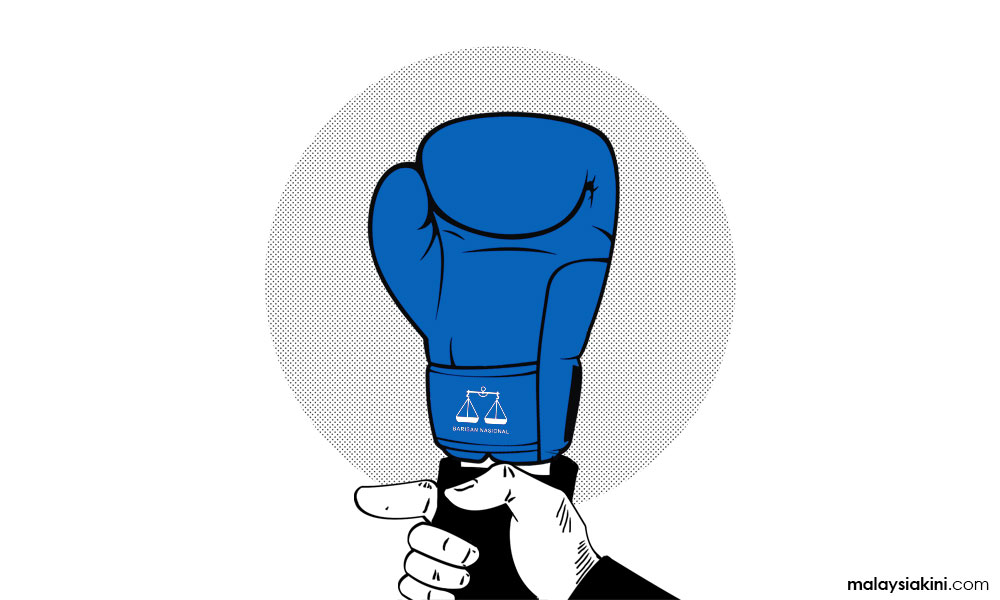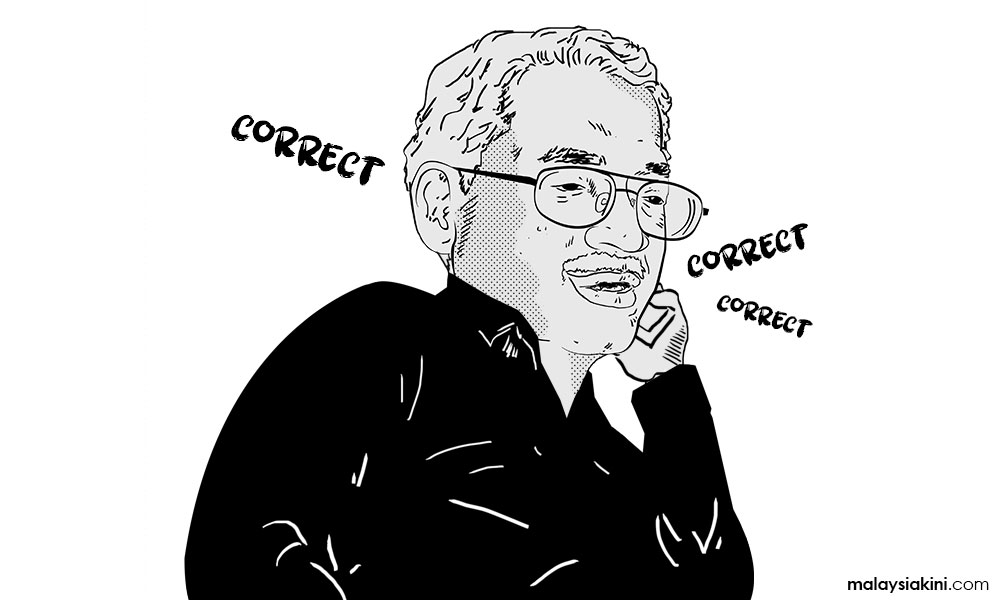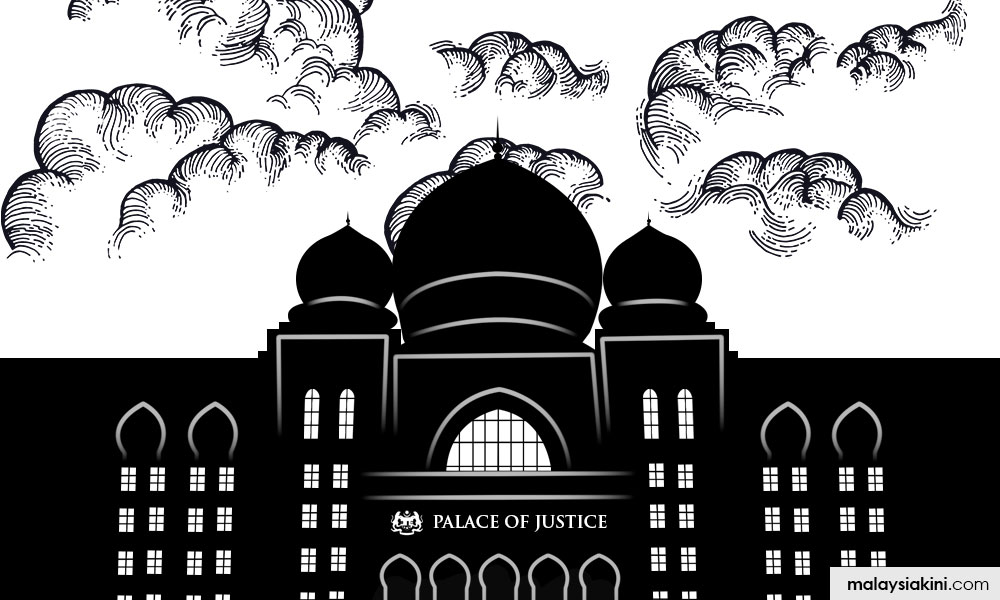
SPECIAL REPORT | In 1995, the DAP lost the Bukit Bintang constituency for the first time since the parliamentary seat was created in 1986.
The party's defeat was not through the ballot box, but rather due to a declaration by a man, who, more than a decade later, would become embroiled in one of the most serious judicial scandals in the country.
On Aug 2, 1995, High Court Judge Ahmad Fairuz Abdul Halim, in presiding over the Bukit Bintang election petition, disqualified Wee Choo Keong as MP due to a prior contempt of court conviction. Wee was with the DAP at the time.
Ahmad Fairuz then went on to make an unprecedented decision of declaring that Wee's defeated MCA rival Lee Chong Meng was the winner, without ordering for a by-election.

The chief justice who headed the judiciary at the time was Eusoff Chin.
Twelve years later in 2007, when YouTube was in its infancy, a series of grainy recordings of a conversation between a lawyer and Fairuz were uploaded onto the video-sharing platform, setting the internet abuzz among Malaysians.
In the video recordings, the lawyer had, among others, revealed his role in getting Ahmad Fairuz confirmed as chief judge of Malaya, the third most senior position in the judiciary, and also promised to seek his advancement to Court of Appeal president.
That lawyer was VK Lingam.
Although the video became public on Sept 19, 2007, the conversation took place in 2002. Within months from the exchange, Ahmad Fairuz was confirmed as the Court of Appeal president in December 2002 and by 2003, was made chief justice.
Lingam claimed he had consulted with Eusoff on appointments of judges.
He also claimed that he had tycoon Vincent Tan and then deputy minister Tengku Adnan Tengku Mansor "whisper" in Dr Mahathir Mohamad's ear, during the latter’s first tenure as prime minister.
Lingam's colourful speech, such as his repetition of "correct, correct, correct" in the conversation may have become one of the earliest Internet memes for Malaysians, but for legal observers, the contents of the recordings were disturbing.

They suggested that external forces were deciding on who became judges and potentially controlling how they decided on cases.
"No, don't worry, Datuk, I know how much you suffered for Tun Eusoff Chin. And Tun said Datuk Ahmad Fairuz 110 percent loyalty (sic). We want to make sure our friends are there for the sake of PM and for the sake of the country...
"Well, you suffered so much, so much you have done - for the election petition, Wee Choo Keong, everything. How much, nobody would have done all these," Lingam had told Fairuz in the recording.
The reference to the Bukit Bintang election petition in the conversation deepened suspicions about the court decision and raised questions about a string of past cases.
Six days after the Lingam tapes were made public, the government agreed to the setting up of a Royal Commission of Inquiry (RCI) to look into the matter.
A window to the past
It was not the first time the figures mentioned in the video recordings - Lingam, Eusoff and Vincent - had come together.
In 1994, the same year Eusoff became chief justice, he holidayed with Lingam's family and also Tan Chong Paw, who was the bodyguard to Vincent, in New Zealand.

This was detailed in 2000 based on reports by UK private investigation firm Bowman Investigations. Both Lingam and Eusoff would later claim the trip was a mere coincidence.
But the RCI into the VK Lingam tapes, which also looked into the holiday trip, would later note: "Given the amazing number of alleged coincidences... we need no more than mere common sense to detect the incredulity of that proposition. In the circumstances, we are unable to accept the veracity of the denials".
The observation is significant as Lingam and Eusoff would in the years to come, appear in in the same court. In any normal circumstances, the judge would have recused him or herself due to a conflict of interest.
In 1996, Lingam appeared as a lawyer for Vincent in a defamation suit against journalist MGG Pillai and others, where the tycoon was awarded a record-setting RM10 million in damages.
Pillai appealed the case all the way to the Federal Court, which came before a three-member panel led by Eusoff. The panel upheld the decision against Pillai but reduced the damages to RM2 million.
Twelve years later in 2008, Lingam's former secretary G Jayanti would testify to the RCI that Lingam had written the judgment for the RM10 million defamation suit and that she and two other secretaries were involved in the "confidential typing".
Pillai passed away in 2006.
The controversial Federal Court panel
In an earlier case involving a commercial dispute between Ayer Molek Rubber Company and Insas Bhd in April 1995, the High Court ordered Ayer Molek to transfer its shares to Insas within 48 hours.
Ayer Molek applied to set aside the order but the High Court judge set the hearing date beyond the 48-hour period and refused to grant a stay on the order (temporary postponement), leaving Ayer Molek with no choice but to transfer the shares. Insas was represented by Lingam.
After the shares were transferred, Ayer Molek still appealed at the Court of Appeal, where a panel led by Court of Appeal judge NH Chan concluded that an injustice had been “perpetrated by a court of law".
The panel said that while it can no longer stay the order as the shares were already transferred, it restrained Insas from doing anything to its newly-owned shares, stressing that it must "correct" an injustice.
Chan concluded his July 31, 1995 judgment by quoting Shakespeare's Hamlet: "Something is rotten in the state of Denmark", in reference to Denmark House in Kuala Lumpur, where the High Court was located at the time.
A Federal Court panel led by Eusoff overturned the Court of Appeal's decision 12 days later and expunged parts of the Court of Appeal decision, including that Insas' lawyers, Lingam among them, had abused the court process.
However, the three-member panel put together by Eusoff raised eyebrows as it comprised a High Court judge.
While a Court of Appeal judge can be co-opted into a Federal Court panel, a High Court judge is not allowed to make a "double jump" to sit in the apex court.
Lingam's younger brother K Thirunama would later testify to the RCI that Lingam, two months after that decision, brought Eusoff and his wife to visit a house in Petaling Jaya, which Lingam offered to them.

According to Thirunama, who accompanied Lingam there, the couple was unhappy with the house and wanted a bigger piece of land to build a house of their own choosing, which Lingam agreed to and asked Thirunama to look for a suitable one.
Thirunama also testified that he delivered gifts on behalf of Lingam to Eusoff's family in 1996, including a handbag, wallet and mobile phone.
Twenty years after the Ayer Molek case, retired Court of Appeal Judge KC Vohrah, who sat on the panel together with Chan, would also reveal that Eusoff tried to interfere with their decision.
The other panel member was Court of Appeal judge Siti Norma Yaakob.
The judge who dared stand up to Lingam
The Pillai and Ayer Molek cases caught global attention and the International Commercial Litigation magazine, in its November 1995 edition, published an article titled "Malaysian Justice on Trial", suggesting that Lingam and Vincent had links to judges.
Lingam filed an RM100 million suit against several lawyers, journalists and others over the article.
He argued that the Court of Appeal judgment in the Ayer Molek case had been expunged by the Federal Court led by Eusoff. However, his defamation suit was dismissed by the High Court judge Mohd Hishamudin Mohd Yunus in 2006.
In a bold decision, Hishamudin ruled that the Court of Appeal decision in the Ayer Molek case was "intact" and "binding" as the Federal Court panel only comprise two legally competent judges, while the third, the high court judge, was not legally competent to sit on the panel.
Hishamudin, who retired as a Court of Appeal judge in 2015, was subsequently denied promotion to the Federal Court three times.

From the Bukit Bintang election petition to the Pillai defamation suit and Ayer Molek case, the Lingam tapes and subsequent RCI in 2007 helped provide context to several anomalous cases that took place more than a decade prior.
Although the RCI recommended action against the personalities in the video recording, no measures were ever taken.
The RCI concluded its finding by saying that not only must the patient be treated but the disease eradicated.
“In other words, a determined effort must be made to get to the root of the malaise which has been uncovered,” it said.
Two years later in 2009, the Judicial Appointments Committee (JAC) came into force just two months before then-prime minister Abdullah Ahmad Badawi retired.
It was meant to help to vet and ensure independent judges but the final say still lie with the prime minister with no means of veto. Questions about the judiciary persisted.
Today, amid renewed debate about the judiciary’s integrity and independence, has the root of the malaise been addressed? - Mkini


No comments:
Post a Comment
Note: Only a member of this blog may post a comment.